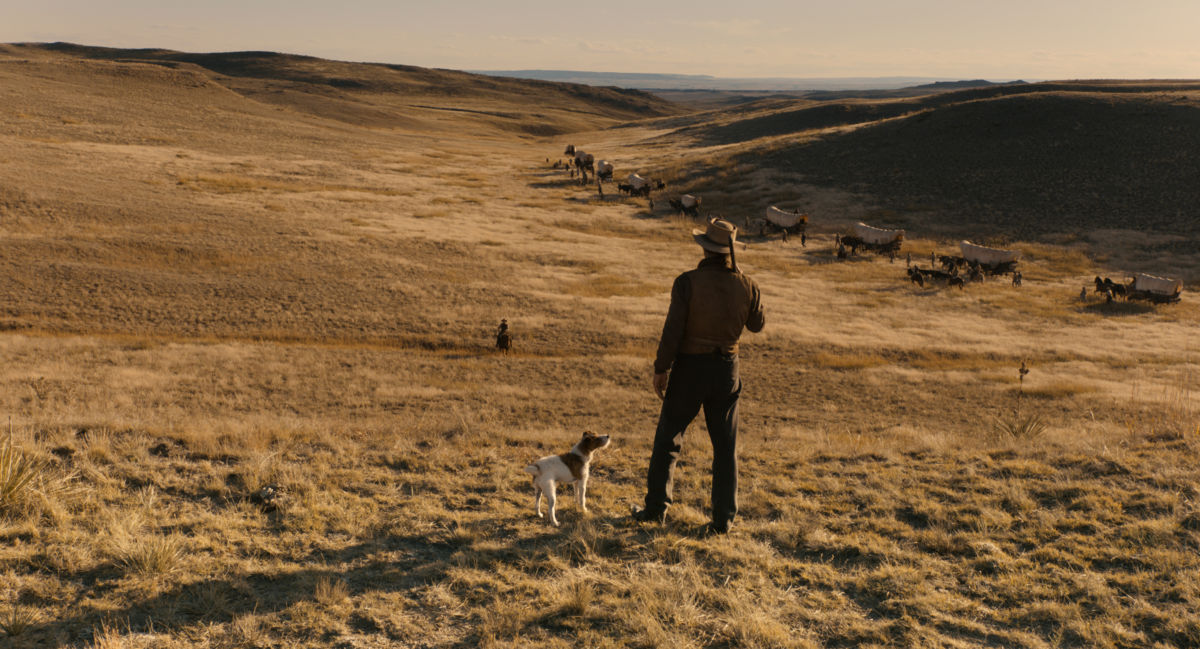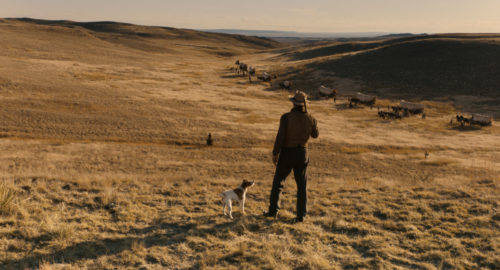The Coen brothers have practically reinvented the western genre in Hollywood, coming out with hits such as the remake of True Grit and No Country for Old Men, their modern western that swept the Academy Awards. The Ballad of Buster Scruggs continues their domination and solidifies the Coens (once again) as some of the best filmmakers working today. It is a dark, beautiful, tragic, morbid, and yet hilarious journey through life in the old American West, and how its harshness and absurdity still bleeds through into life here today.
The Ballad of Buster Scruggs is separated into six different sections. None are connected to each other, but each carry on a version of the same primary ideas and themes. The first story shares the same name as the title of the film, and it stars Tim Blake Nelson as Buster Scruggs himself. Scruggs is a wanted man labeled “The Misanthrope” who travels through the plains strumming his guitar, singing songs, and leaving devastation in his wake. The Misanthrope racks up a high body count as he strolls through town, all with Nelson’s trademark dopey grin lighting up his face.
The Ballad of Buster Scruggs pulls you into the Coen’s violent and ridiculous vision of the Old West – you’ll be cackling with laughter at Scrugg’s singing and dancing as townspeople howl in agony over the murder of their loved ones. The absurdity of it all creates an atmosphere of hilarity mixed with uncomfortableness of what exactly it is that you’re laughing at; death becomes a joke, a punchline, yet somehow at the same time you’re forced into having to look at the consequences of it, and how it comes for us all in the end. It’s the best possible start to the anthology film.
Next up is Near Algodones, the shortest of the bunch. James Franco attempts a bank robbery that quickly goes wrong, and his punishment gets stretched out to near comedic levels. While the humor found throughout the whole film is morbid, Near Algodones is the first to present it dryly, doing away with the blatant silliness of the Buster Scruggs section. There’s an almost cheery bleakness to a scene where Franco faces the gallows with a resigned smile and a chuckle. Perhaps that’s how we should all accept our fate, ill-timed or not.
In Meal Ticket, Liam Neeson plays an aging impresario who travels with his act, a young man named Harrison with no arms or legs (Harry Melling). Harrison recites famous works such as Shakespeare, the Gettysburg Address, and biblical stories, while the impresario performs all of the physical labor involved in setting up the stage and transporting everything. And, of course, he has to assist Harrison in everyday tasks. The Coen’s ditch the humor this time around to dive into something truly dramatic and devastating. The story is told through almost no dialogue save for Harrison’s performances – the bleak and dreary atmosphere permeates the towns as the audiences grow smaller and more indifferent. As the road gets rougher, you’ll have to wonder: Is the impresario helping Harrison out of the goodness of his heart, or is the boy, as the title suggests, simply a current means to an end?
https://www.youtube.com/watch?v=YES0lLXIIz4
In the fourth segment, All Gold Canyon, Tom Waits is an old prospector who hits the golden jackpot, although it doesn’t come easily. To say anything else would be risking spoilers, but this one has the most stunning and beautiful scenery out of the entire film, and it easily became my favorite out of all six stories. Waits delivers an almost entirely solitary performance, singing softly to himself as he goes about his work. It’s an uplifting palate cleanser after the downer that was the previous segment.
By the time you reach The Gal Who Got Rattled, the movie’s runtime will begin to wear you down. It can become a bit exhausting having to invest in a new story and characters over and over again. Luckily, The Gal Who Got Rattled starts slow but easily becomes one of film’s strongest, telling the tale of a journeying wagon train and its trek towards Oregon. A young man and woman (Zoe Kazan and Bill Heck, respectively) grow fond of each other throughout the journey and find comfort and solace in one another. The performances are wonderful and being the only romance in the film, it’s treated with care and believability. It’s the most cinematic of the bunch, with a few unexpected turns.
The film ends on a note that’s a bit different from the rest. Taking place entirely within a stagecoach, five people converse with one another as they patiently await their arrival at a hotel. The topics range from the simplicity of human nature and desires, to faithfulness in a higher power, and finally, of course, to death. The Coen’s show off all of their tricks in this film, going from segments told almost entirely through visuals to this final one, The Mortal Remains, being told exclusively through dialogue. It’s the most poignant story in its handling of the recurring theme of death and everything that comes with it.
The Ballad of Buster Scruggs is, at its core, about the finality of death. It’s about its randomness, cruelty, unfairness, indifference, and the ultimate absurdity of it all. The film views and presents death in several different contexts and approaches, ranging from tragic and depressing to hilarious and calculated. It’s pessimism packaged in a good natured way, it’s the acceptance that bad things happen to good people and sometimes there’s nothing you can do but laugh. It’s desensitizing, sad, dark, but funny, all the same. It’s the Coen brothers’ western symphony, complete with their incredible, vast landscapes and wicked sense of humor. It’s the most clear look into their worldview – a weary, resigned grasp of the unfairness of it all, but coupled with a grim smile.
Some of the coverage you find on Cultured Vultures contains affiliate links, which provide us with small commissions based on purchases made from visiting our site.


